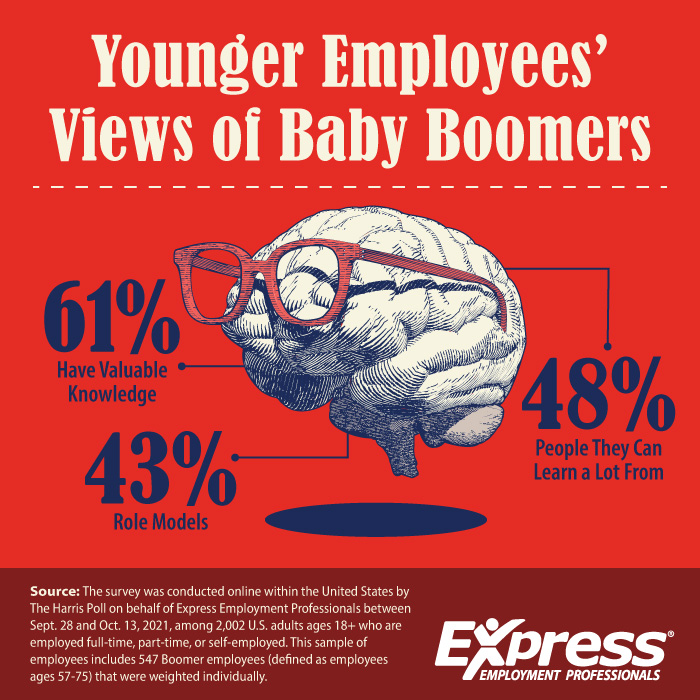47% of U.S. Employees Forced to Self-Train Due to Lack of Knowledge Transfer from Retiring Employees
Brighton/Howell MI - May 25, 2022
As senior employees prepare to exit the workforce, 84% of U.S. employees say it's a big loss when older employees retire without passing on their years of knowledge to younger employees. And when the transfer of knowledge fails to happen, workers can be left learning how to do a job on their own with nearly half of U.S. employees (47%) experiencing this.
This is according to a recent survey from The Harris Poll Commissioned by Express Employment Professionals.
In the workplace, baby boomers are more likely than their younger counterparts to feel knowledgeable (66% vs. 49%-57%), and this is reiterated by younger employees who say they view boomers in the workplace as having valuable knowledge (61%), people they can learn a lot from (48%) and as role models to look up to (43%).

Fewer younger employees view boomers as behind the times of technology (19%), less productive (11%) or as a source of delays on projects (8%). Further, only 15% of U.S. employees say figuring out how to work with employees of other ages is a current challenge for them in the workplace; among boomers, this challenge has decreased from 2018 (12% in 2021 vs. 18% in 2018).
Other challenges such as keeping up with new technology (22% vs. 36%), maintaining work/life balance (17% vs. 32%) and figuring out ways to share their knowledge with others at their company (11% vs. 17%) are less common for boomers now than four years ago.
Most U.S. employees (73%) say it's absolutely essential or very important for employees to share the knowledge needed to perform their job responsibilities with others. Encouragingly, the majority (66%) believe their employer is taking the right steps to make sure they don't experience a "brain drain" (i.e., when older employees retire without sharing knowledge of how to do their job with younger generations).
To prepare those successors for their retirement, more than half of boomers (59%) have shared all or more than half of the knowledge needed to perform their job responsibilities with others who will need the information after they retire. This has increased significantly from 2018 (43%).
Despite this uptick in knowledge sharing, more than a quarter (27%) say the processes at their organization change so often that their knowledge and experience in their role will be irrelevant by the time they retire-though this has decreased significantly from 2018 (33%).
"Baby boomers in the workforce are usually the ones who have longer-term knowledge of the business, understand the flow and seasonality of a company and stick it out when situations get busy or challenging," said Beth Cary, Express franchise owner in Virginia.
As with everything else, adaptation will take place regardless of the circumstances with more forward-thinking employers taking the time to glean as much as they can from their retiring workforce before they leave.
"This can be accomplished via focus groups or other similar data gathering methods that can be performed before retirement," Cary added. "Retiring workers want to feel valued and should be very open to this type of data gathering."
Deb Gray, Express franchise owner in Pennsylvania, agrees that planned exits for baby boomers that include adequate knowledge transfers should make the impact of departures minimal.
"It's also important to develop a bench of talent and always look to bring up the next new leader or expert," she said. "And don't be afraid to fail up. Listen more and acknowledge the multi-generational and cultural differences. Set a culture that works for all and strive to maintain or course correct the culture based on business and people needs."
Every generation brings value to the workforce, and time is running out to enact knowledge succession plans for these senior employees, according to Express Employment International CEO Bill Stoller.
"While many practices and processes have changed over the years in the labor force, baby boomers have so much wisdom and life experience to pass on to benefit today's newest workers," he added.
Survey Methodology
The survey was conducted online within the United States by The Harris Poll on behalf of Express Employment Professionals between Sept. 28 and Oct. 13, 2021, among 2,002 U.S. adults ages 18+ who are employed full-time, part-time, or self-employed. Data were weighted where necessary by age, by gender, education, race/ethnicity, region, household income, household size, and marital status to bring them into line with their actual proportions in the population. This sample of employees includes 547 boomer employees (defined as employees ages 57-75) that were weighted individually.